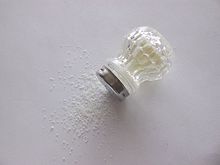
Salt consumption has been intensely studied for its role in human physiology and impact on human health. In particular, excessive dietary salt consumption over an extended period of time has been associated with hypertension and cardiovascular disease, in addition to other adverse health effects[1][2].
Most forms of edible salt are composed primarily of sodium and chloride, as other minerals such as magnesium and calcium, make unrefined salts bitter and therefore rarely eaten.[3] An excessive intake of the ionic compound sodium chloride has long been suspected to increase blood pressure[4]. Sodium and chloride serum levels are both carefully controlled by the kidneys, and acute and chronic excessive intake of both ions can cause adverse health effect.[5]. However, only serum sodium is thought to be strongly correlated to blood pressure levels and cardiovascular disease
Effect of Salt on Blood Pressure edit
The human body has evolved to balance salt intake with need through means such as the renin-angiotensin system. In humans, salt plays two important biological functions. The first function is nerve function. The other function, relevant to risk of cardiovascular disease, is the maintenance of body fluid volume, including osmotic balance in the blood, extracellular and intracellular fluids[6].
Since sodium
DASH-Sodium Study edit
Hypertension and Cardiovascular Disease edit
Recommended Intake edit
Current Trends and Campaigns edit
Sodium Sensitivity edit
Salt substitutes edit
Potassium and hypertension edit
Possible mechanisms by which high intakes of dietary potassium can decreases risk of hypertension and instances of cardiovascular disease have been proposed but not extensively studied[7]. However studies have found a strong inverse association between long-term adequate to high rates of potassium intake and the development of cardiovascular diseases[8].
See also edit
References edit
- ^ Institute of Medicine. Dietary Reference Intakes for Water, Potassium, Sodium, Chloride and Sulfate. Washington, DC: National Academy Press, 2004.
- ^ Klaus D, Böhm M, Halle M, et al. (May 2009). "[Restriction of salt intake in the whole population promises great long-term benefits]" (in German). Deutsche Medizinische Wochenschrift (1946) 134 Suppl 3: S108–18. doi:10.1055/s-0029-1222573. PMID 19418415.
- ^ Ann Louise Gittleman, Sodium is essential to life. Total health magazine, vol 22, no 2.
- ^ Klaus D, Böhm M, Halle M, et al. (May 2009). "[Restriction of salt intake in the whole population promises great long-term benefits]" (in German). Deutsche Medizinische Wochenschrift (1946) 134 Suppl 3: S108–18. doi:10.1055/s-0029-1222573. PMID 19418415.
- ^ Bengt Anderson 1977. Regulation of body fluids. Ann. Rev. Physiol, 39; 185-200
- ^ Bengt Anderson 1977. Regulation of body fluids. Ann. Rev. Physiol, 39; 185-200
- ^ Young DB, Lin H, McCabe RD. Potassium's cardiovascular protective mechanisms. Am J Physiol. 1995;268:R825-R837.
- ^ Young DB, Lin H, McCabe RD. Potassium's cardiovascular protective mechanisms. Am J Physiol. 1995;268:R825-R837.